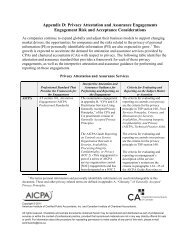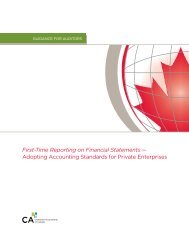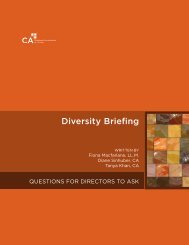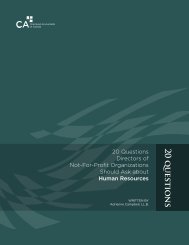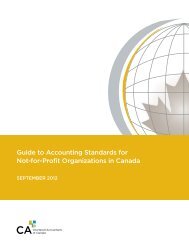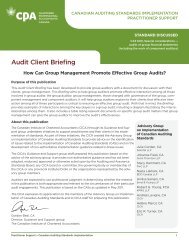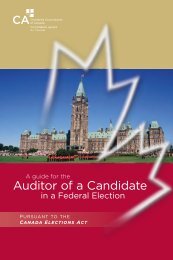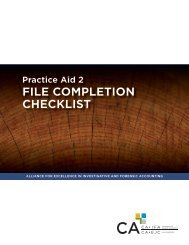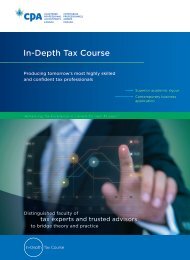20 Questions Directors of Not-for-Profit Organizations Should Ask ...
20 Questions Directors of Not-for-Profit Organizations Should Ask ...
20 Questions Directors of Not-for-Profit Organizations Should Ask ...
You also want an ePaper? Increase the reach of your titles
YUMPU automatically turns print PDFs into web optimized ePapers that Google loves.
<strong>20</strong> <strong>Questions</strong> <strong>Directors</strong> <strong>of</strong> <strong>Not</strong>-For-Pr<strong>of</strong>it <strong>Organizations</strong><br />
<strong>Should</strong> <strong>Ask</strong> about Board Recruitment, Development and Assessment<br />
Committee Charters<br />
A board may act as a committee <strong>of</strong> the whole on<br />
all issues <strong>for</strong> which it is responsible or delegate<br />
responsibility <strong>for</strong> specific issues to a committee<br />
or an individual director (as a committee <strong>of</strong> one).<br />
Board committees should have a committee charter<br />
or mandate.<br />
Committee charters describe the<br />
responsibilities that boards delegate to<br />
committees, such as:<br />
• Oversight over the organization’s<br />
assets, financial structure, investments,<br />
risk management, internal controls,<br />
preparation <strong>of</strong> financial statements and<br />
(where appropriate) the audit <strong>of</strong> the<br />
financial statements (finance, investment<br />
or audit committee);<br />
• The selection, compensation and<br />
succession <strong>of</strong> the CEO and other senior<br />
staff (compensation or human resources<br />
committee);<br />
• Board process and per<strong>for</strong>mance, including<br />
the selection and assessment <strong>of</strong> directors,<br />
recommendation <strong>of</strong> new or revised<br />
board policies and review <strong>of</strong> by-laws<br />
(governance or nominating committee);<br />
• Oversight <strong>of</strong> strategic planning and<br />
per<strong>for</strong>mance (planning or finance<br />
committee); and<br />
• Other areas that require attention<br />
and oversight by the board, such as<br />
membership, fundraising, resources,<br />
quality and safety, in<strong>for</strong>mation technology,<br />
community relations or pr<strong>of</strong>essional<br />
discipline.<br />
While the board may delegate responsibilities<br />
to committees, these committees review,<br />
recommend and report back to the board<br />
<strong>for</strong> approval, i.e., the board retains ultimate<br />
oversight responsibility <strong>for</strong> the organization.<br />
Committee roles and responsibilities depend on<br />
the needs <strong>of</strong> the organization and the board’s<br />
approach to governance and should be reflected<br />
in clear terms <strong>of</strong> reference that are approved by<br />
the board. Committee charters should establish the<br />
purpose <strong>of</strong> the committee, its composition, powers,<br />
responsibilities, reporting obligations and limitations.<br />
Some NPOs expect directors to serve on<br />
committees that are responsible <strong>for</strong> operational<br />
activities. In such cases, the board should recognize<br />
that directors may not be in a position to exercise<br />
independent oversight over the activities <strong>for</strong> which<br />
the committee is responsible, as they would be<br />
required to assess their own work.<br />
For more in<strong>for</strong>mation, please see<br />
the CICA publication <strong>20</strong> <strong>Questions</strong><br />
<strong>Directors</strong> <strong>of</strong> <strong>Not</strong>-<strong>for</strong>-Pr<strong>of</strong>it<br />
<strong>Organizations</strong> <strong>Should</strong> <strong>Ask</strong> about<br />
Governance<br />
4.<br />
Has the board established position<br />
descriptions <strong>for</strong> board roles<br />
Every organization should ensure that its board<br />
members fully understand what is expected <strong>of</strong> them<br />
in their board roles (e.g., board chair, committee<br />
chairs and individual directors). It is not enough to<br />
select people <strong>for</strong> a board and simply expect them<br />
to do the right thing. Even if directors have had<br />
previous board experience, they will need to become<br />
familiar with the organization they are joining in<br />
order to maximize their contribution. New directors<br />
need an orientation to the sector, knowledge <strong>of</strong> how<br />
things are done in the particular organization, and<br />
an understanding <strong>of</strong> the extent to which they will<br />
be expected to participate in operating activities in<br />
addition to their governance role.<br />
Written position descriptions <strong>for</strong> directors,<br />
committee chairs and the board chair are valuable<br />
documents that in<strong>for</strong>m the selection process,<br />
provide guidance <strong>for</strong> orientation and development,<br />
and serve as a basis <strong>for</strong> assessing per<strong>for</strong>mance.<br />
Position descriptions set out expectations <strong>of</strong><br />
directors. In NPOs that expect directors to engage<br />
in operational roles, such as fundraising, organizing<br />
events, etc., it is especially important that these<br />
expectations be included in the relevant position<br />
descriptions and made explicit to prospective<br />
directors.<br />
7




